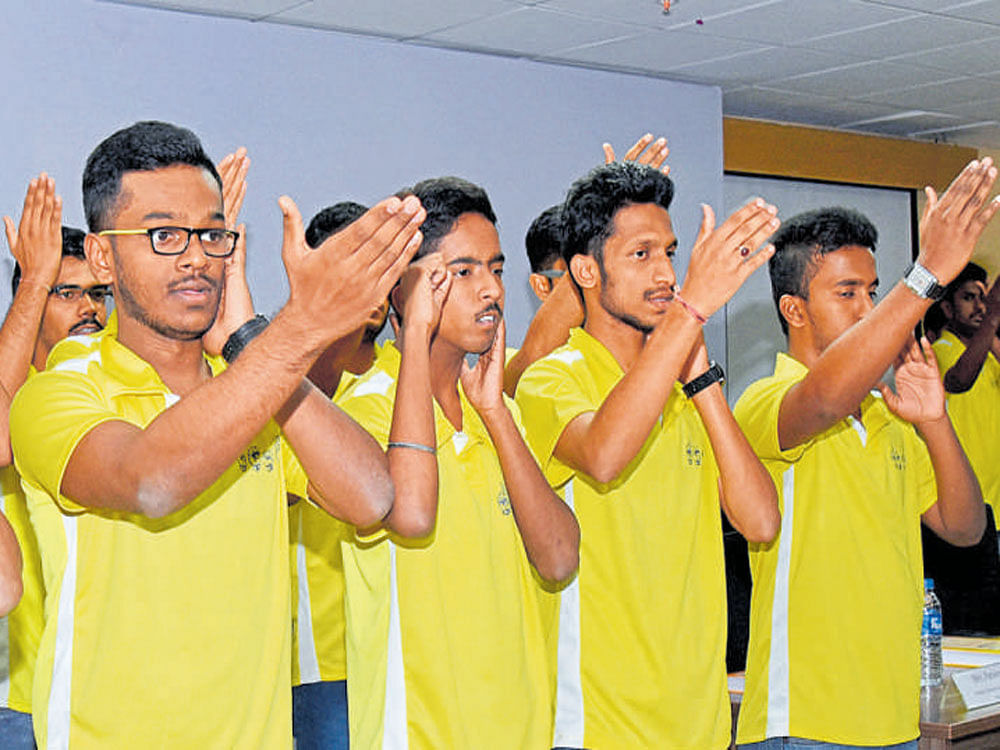India's first sign language dictionary to come up soon
Last Updated IST

The dictionary is being developed in both print and video format. Image for representation.
The government is all set to come up with the country's first-of-its-kind dictionary which aims to bring uniformity in sign languages used by hearing and speech impaired people across the nation.
The Indian Sign Language (ISL) dictionary, which is being developed by the Indian Sign Language Research and Training Centre (ISLRTC), has so far compiled 6,032 Hindi and English words and their corresponding graphic representation of the signs which are used in daily life.
The dictionary is being developed in both print and video format.
"A comprehensive Indian Sign Language Dictionary is the need of the hour to facilitate communication between the hearing and speech impaired and create a basic database for further policy making," Union Social Justice and Empowerment Minister Thaawarchand Gehlot said today.
"Presently, the sign languages in a diverse country like India vary from region to region. Because of this, people from a region face difficulty in communicating with those in the other region," he said at the inauguration of a two-day national conference titled 'Empowering Deaf through Indian Sign Language'.
This dictionary will help bridge the communication gap, Gehlot said.
Awanish K Awasthi, the joint secretary in the Department of Empowerment of Persons with Disabilities under the Ministry of Social Justice and Empowerment said once the dictionary is compiled, around 50 lakh hearing impaired people and 20 lakh speech impaired people in the country will get an uniform language.
"It will contain graphic representations of popular signs used by the hearing impaired and will also include regional variations. Apart from that, it will have legal, technical and medical terms," Awasthi said.
"It will promote the use of sign language for hearing impaired students at schools and colleges. It will also enable government officials, teachers, professionals, community leaders and the public at large to learn and use sign language," he said.
The government is also developing a directory of interpreters as the hearing and speech impaired people mostly depend on them to communicate.
"It will enable the public utility organisations like banks, hospitals, airports, courts and others to utilise the services of interpreters," Awasthi said.
The Indian Sign Language (ISL) dictionary, which is being developed by the Indian Sign Language Research and Training Centre (ISLRTC), has so far compiled 6,032 Hindi and English words and their corresponding graphic representation of the signs which are used in daily life.
The dictionary is being developed in both print and video format.
"A comprehensive Indian Sign Language Dictionary is the need of the hour to facilitate communication between the hearing and speech impaired and create a basic database for further policy making," Union Social Justice and Empowerment Minister Thaawarchand Gehlot said today.
"Presently, the sign languages in a diverse country like India vary from region to region. Because of this, people from a region face difficulty in communicating with those in the other region," he said at the inauguration of a two-day national conference titled 'Empowering Deaf through Indian Sign Language'.
This dictionary will help bridge the communication gap, Gehlot said.
Awanish K Awasthi, the joint secretary in the Department of Empowerment of Persons with Disabilities under the Ministry of Social Justice and Empowerment said once the dictionary is compiled, around 50 lakh hearing impaired people and 20 lakh speech impaired people in the country will get an uniform language.
"It will contain graphic representations of popular signs used by the hearing impaired and will also include regional variations. Apart from that, it will have legal, technical and medical terms," Awasthi said.
"It will promote the use of sign language for hearing impaired students at schools and colleges. It will also enable government officials, teachers, professionals, community leaders and the public at large to learn and use sign language," he said.
The government is also developing a directory of interpreters as the hearing and speech impaired people mostly depend on them to communicate.
"It will enable the public utility organisations like banks, hospitals, airports, courts and others to utilise the services of interpreters," Awasthi said.